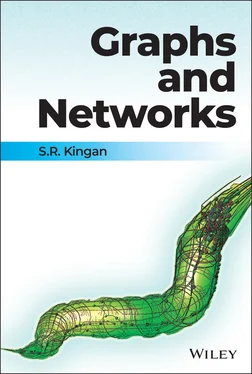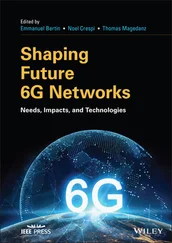S. R. Kingan - Graphs and Networks
Здесь есть возможность читать онлайн «S. R. Kingan - Graphs and Networks» — ознакомительный отрывок электронной книги совершенно бесплатно, а после прочтения отрывка купить полную версию. В некоторых случаях можно слушать аудио, скачать через торрент в формате fb2 и присутствует краткое содержание. Жанр: unrecognised, на английском языке. Описание произведения, (предисловие) а так же отзывы посетителей доступны на портале библиотеки ЛибКат.
- Название:Graphs and Networks
- Автор:
- Жанр:
- Год:неизвестен
- ISBN:нет данных
- Рейтинг книги:4 / 5. Голосов: 1
-
Избранное:Добавить в избранное
- Отзывы:
-
Ваша оценка:
- 80
- 1
- 2
- 3
- 4
- 5
Graphs and Networks: краткое содержание, описание и аннотация
Предлагаем к чтению аннотацию, описание, краткое содержание или предисловие (зависит от того, что написал сам автор книги «Graphs and Networks»). Если вы не нашли необходимую информацию о книге — напишите в комментариях, мы постараемся отыскать её.
A unique blend of graph theory and network science for mathematicians and data science professionals alike.
Graphs and Networks — читать онлайн ознакомительный отрывок
Ниже представлен текст книги, разбитый по страницам. Система сохранения места последней прочитанной страницы, позволяет с удобством читать онлайн бесплатно книгу «Graphs and Networks», без необходимости каждый раз заново искать на чём Вы остановились. Поставьте закладку, и сможете в любой момент перейти на страницу, на которой закончили чтение.
Интервал:
Закладка:
Table of Contents
1 Cover
2 Title Page Graphs and Networks S. R. Kingan Brooklyn College and The Graduate Center, City University of New York, New York, NY, USA.
3 Copyright
4 Dedication
5 List of Figures
6 Preface
7 1 From Königsberg to Connectomes 1.1 Introduction 1.2 Isomorphism 1.3 Constructions and Minors Exercises Topics for Deeper Study Notes
8 2 Fundamental Topics 2.1 Trees 2.2 Distance 2.3 Degree Sequences 2.4 Matrices Exercises Topics for Deeper Study Notes
9 3 Similarity and Centrality 3.1 Similarity Measures 3.2 Centrality Measures 3.3 Eigenvector and Katz Centrality 3.4 PageRank Exercises Topics for Deeper Study Notes
10 4 Types of Networks 4.1 Small‐World Networks 4.2 Scale‐Free Networks 4.3 Assortative Mixing 4.4 Covert Networks Exercises Topics for Deeper Study Notes
11 5 Graph Algorithms 5.1 Traversal Algorithms 5.2 Greedy Algorithms 5.3 Shortest Path Algorithms Exercises Topics for Deeper Study Notes
12 6 Structure, Coloring, Higher Connectivity 6.1 Eulerian Circuits 6.2 Hamiltonian Cycles 6.3 Coloring 6.4 Higher Connectivity 6.5 Menger's Theorem Exercises Topics for Deeper Study Notes
13 7 Planar Graphs 7.1 Properties of Planar Graphs 7.2 Euclid's Theorem on Regular Polyhedra 7.3 The Five Color Theorem 7.4 Invariants for Non‐planar Graphs Exercises Topics for Deeper Study Notes
14 8 Flows and Matchings 8.1 Flows in Networks 8.2 Stable Sets, Matchings, Coverings 8.3 Min–Max Theorems 8.4 Maximum Matching Algorithm Exercises Topics for Deeper Study Notes
15 Appendix A: Linear Algebra
16 Appendix B: Probability and Statistics
17 Appendix C: Complexity of Algorithms Notes
18 Appendix D: Stacks and Queues
19 Bibliography
20 Index
21 End User License Agreement
List of Illustrations
1 Chapter 1 Figure 1.1 The bridges of Königsberg. Figure 1.2 The prism graph. Figure 1.3 An example of a graph, multigraph, digraph, and network. Figure 1.4 Traveling salesman network. Figure 1.5 Strongly connected digraphs. Figure 1.6 Complete graphs. Figure 1.7 Paths, cycles, and wheels. Figure 1.8 Bipartite and tripartite graphs. Figure 1.9 Star graphs. Figure 1.10 Example of trees. Figure 1.11 Subgraphs. Figure 1.12 Two drawings of a planar graph. Figure 1.13 C. elegans connectome. Figure 1.14 C. elegans in‐degree (top) and out‐degree (bottom) distributions... Figure 1.15 Three pairs of isomorphic graphs. Figure 1.16 The non‐isomorphic graphs on  vertices. Figure 1.17 The non‐identical graphs on
vertices. Figure 1.17 The non‐identical graphs on  vertices. Figure 1.18 Shapes of graphs. Figure 1.19 The Erdős‐1 collaboration graph. Figure 1.20 Two non‐isomorphic graphs and their decks of vertex‐deletions. Figure 1.21 An example of a join. Figure 1.22 Two examples of Cartesian products. Figure 1.23 The four‐dimensional cube. Figure 1.24
vertices. Figure 1.18 Shapes of graphs. Figure 1.19 The Erdős‐1 collaboration graph. Figure 1.20 Two non‐isomorphic graphs and their decks of vertex‐deletions. Figure 1.21 An example of a join. Figure 1.22 Two examples of Cartesian products. Figure 1.23 The four‐dimensional cube. Figure 1.24  and
and  . Figure 1.25 Examples of complements. Figure 1.26 Examples of a subdivision. Figure 1.27 Line graphs. Figure 1.28 Forbidden induced subgraphs for line graphs. Figure 1.29 Example of edge‐deletions and edge‐contractions. Figure 1.30 Petersen graph. Figure 1.31 Examples of graphs and digraphs. Figure 1.32 Pairs of graphs for isomorphism testing. Figure 1.33 A graph that contains all nine forbidden induced subgraphs for l...
. Figure 1.25 Examples of complements. Figure 1.26 Examples of a subdivision. Figure 1.27 Line graphs. Figure 1.28 Forbidden induced subgraphs for line graphs. Figure 1.29 Example of edge‐deletions and edge‐contractions. Figure 1.30 Petersen graph. Figure 1.31 Examples of graphs and digraphs. Figure 1.32 Pairs of graphs for isomorphism testing. Figure 1.33 A graph that contains all nine forbidden induced subgraphs for l...
2 Chapter 2Figure 2.1 Non‐isomorphic trees on  vertices.Figure 2.2 Spanning trees.Figure 2.3 An example for Cayley's tree counting theorem.Figure 2.4 A tree with a left and right vertex.Figure 2.5 Eccentricity, diameter, and radius.Figure 2.6 Cut vertices and bridges.Figure 2.7 Cospectral graphs with respect to the adjacency matrix.Figure 2.8 Examples of graphs and digraphs.Figure 2.9 Three pairs of cospectral graphs.
vertices.Figure 2.2 Spanning trees.Figure 2.3 An example for Cayley's tree counting theorem.Figure 2.4 A tree with a left and right vertex.Figure 2.5 Eccentricity, diameter, and radius.Figure 2.6 Cut vertices and bridges.Figure 2.7 Cospectral graphs with respect to the adjacency matrix.Figure 2.8 Examples of graphs and digraphs.Figure 2.9 Three pairs of cospectral graphs.
3 Chapter 3Figure 3.1 Customer‐item bipartite graph.Figure 3.2 A graph and a digraph for centrality measures.Figure 3.3 A graph and a digraph.Figure 3.4 Schoch and Brandes graphs.Figure 3.5 A small town map.
4 Chapter 4Figure 4.1  with a standard scale and a log–log scale.Figure 4.2 The in‐degree distribution of the high energy physics citation di...Figure 4.3 Classification of 1958 couples based on race.Figure 4.4 Assortativity function for the Erdős‐1 collaboration graph.Figure 4.5 Regional Schools Network and Organizations Network.
with a standard scale and a log–log scale.Figure 4.2 The in‐degree distribution of the high energy physics citation di...Figure 4.3 Classification of 1958 couples based on race.Figure 4.4 Assortativity function for the Erdős‐1 collaboration graph.Figure 4.5 Regional Schools Network and Organizations Network.
5 Chapter 5Figure 5.1 Step‐by‐step explanation of DFS and BFS.Figure 5.2 Kruskal's and Prim's algorithms.Figure 5.3 A Weighted Digraph.Figure 5.4 Dijkstra's Algorithm.Figure 5.5 Examples of weighted graphs.Figure 5.6 Example of a weighted digraph.
6 Chapter 6Figure 6.1 Hierholzer's algorithm.Figure 6.2 Eulerizing graphs.Figure 6.3 Hamiltonian graphs.Figure 6.4 Kirkman's graph and  .Figure 6.5 Non‐Hamiltonian graphs.Figure 6.6 Closure of a graph.Figure 6.7 Graph coloring.Figure 6.8 Greedy Coloring Algorithm.Figure 6.9 Vertex and edge connectivity.Figure 6.10 Ear decompositions.Figure 6.11 An example for Menger's TheoremFigure 6.12 Deletion and contraction of the edges of
.Figure 6.5 Non‐Hamiltonian graphs.Figure 6.6 Closure of a graph.Figure 6.7 Graph coloring.Figure 6.8 Greedy Coloring Algorithm.Figure 6.9 Vertex and edge connectivity.Figure 6.10 Ear decompositions.Figure 6.11 An example for Menger's TheoremFigure 6.12 Deletion and contraction of the edges of  .
.
7 Chapter 7Figure 7.1 Stereographic projection.Figure 7.2 Geometric dual.Figure 7.3 Non‐isomorphic graphs with isomorphic geometric duals.Figure 7.4 Schlegel diagram of a cube.Figure 7.5 Graphs that do not correspond to convex polyhedra.Figure 7.6 Platonic solids.Figure 7.7 Tutte's counterexample to Tait's conjecture.Figure 7.8  with 3 edge crossings.Figure 7.9
with 3 edge crossings.Figure 7.9  embedded on the torus.
embedded on the torus.
8 Chapter 8Figure 8.1 Network flows.Figure 8.2 Flow augmenting path.Figure 8.3 Stable sets, matchings, and coverings.Figure 8.4 A system of distinct representatives.Figure 8.5  ‐augmenting path.Figure 8.6 Matchings and blossoms.Figure 8.7
‐augmenting path.Figure 8.6 Matchings and blossoms.Figure 8.7  ‐alternating trees.Figure 8.8 Flower.Figure 8.9 A graph with a matching.Figure 8.10 A graph with a larger matching.
‐alternating trees.Figure 8.8 Flower.Figure 8.9 A graph with a matching.Figure 8.10 A graph with a larger matching.
9 4Figure D.1 Example of a stack.Figure D.2 Example of a queue.
Guide
1 Cover Page
2 Table of Contents
3 Title Page Graphs and Networks S. R. Kingan Brooklyn College and The Graduate Center, City University of New York, New York, NY, USA.
4 Copyright
5 Dedication
6 List of Figures
7 Preface
8 Begin Reading
9 Appendix A Linear Algebra
10 Appendix B Probability and Statistics
11 Appendix C Complexity of Algorithms
Читать дальшеИнтервал:
Закладка:
Похожие книги на «Graphs and Networks»
Представляем Вашему вниманию похожие книги на «Graphs and Networks» списком для выбора. Мы отобрали схожую по названию и смыслу литературу в надежде предоставить читателям больше вариантов отыскать новые, интересные, ещё непрочитанные произведения.
Обсуждение, отзывы о книге «Graphs and Networks» и просто собственные мнения читателей. Оставьте ваши комментарии, напишите, что Вы думаете о произведении, его смысле или главных героях. Укажите что конкретно понравилось, а что нет, и почему Вы так считаете.











